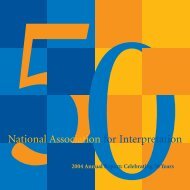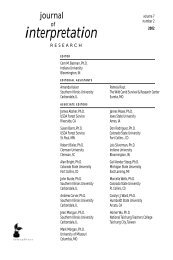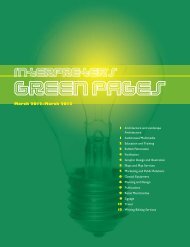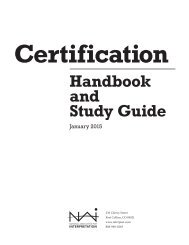interpretation
Volume 15, Number 1 - National Association for Interpretation
Volume 15, Number 1 - National Association for Interpretation
Create successful ePaper yourself
Turn your PDF publications into a flip-book with our unique Google optimized e-Paper software.
a n e v a l u a t i o n o f t h e i m p a c t o f r i v e r g u i d e i n t e r p r e t a t i o n tr aining<br />
these natural resources depends on how they are perceived and experienced by tourists<br />
(Daily, 1997; Vygotsky, 1978). Impacts to the natural environment are intensified by an<br />
individual’s behavior, either knowingly or unknowingly. These behaviors are largely<br />
dependent on one’s perceptions of and experiences in the environment (Petrosillo,<br />
Zurlini, Corlianò, Zaccarelli, & Dadamo, 2007). Feelings or affective attachments for the<br />
environment can be determined through participation in outdoor recreation activities<br />
(Vygotsky, 1978; Novak, 1998). Nature-based interpretive programs offer tourists the<br />
opportunity to participate and learn more about an area.<br />
Interpretation has a long history of educating tourists regarding a natural area’s<br />
conservation objectives, and has been used as a tool to enhance the tourist experience<br />
(Sharpe, 1982; Orams, 1996; Ham & Krumpe, 1996). Ecotourism with an emphasis<br />
on environmental <strong>interpretation</strong> can prevent or reduce the inherent negative impacts<br />
with which it is associated (Kimmel, 1999). Previous research has also indicated that<br />
river guides may be an important and potentially underused source through which<br />
environmental <strong>interpretation</strong> can take place (Bange, 1984; Roggenbuck, Williams, &<br />
Bobinski, 1992; Harrison & Banks, 2008).<br />
Methods<br />
The study was conducted at a satellite site of the Nantahala Outdoor Center located on<br />
the French Broad River in western North Carolina, near Hot Springs. This particular<br />
site was chosen because of the relatively large number of guide employees (ten) who<br />
had participated in the HWI. The data was gathered in a convenience sample over<br />
the course of three high-use days in August 2007. Over the three-day period, the two<br />
authors gave an “interest and knowledge scale”—pre- and post-rafting experience—to<br />
all NOC river raft guide clients who agreed to participate. The questionnaires consisted<br />
of 18 Likert scale questions. The questions gauged both “interest in the environment”<br />
and “knowledge of the environment.” Some sample questions include: “How much are<br />
you interested in protecting the river area?” and “How much do you know about the<br />
water quality of this area?” This resulted in 97 useable questionnaires. Group 1 (n=39)<br />
consisted of those clients whose guides went to the HWI seminar and Group 2 (n=58)<br />
were those clients whose guides did not attend.<br />
The “interest and knowledge scale” was totaled and statistical analysis consisted<br />
of paired sample t-tests to determine change in client environmental knowledge and<br />
interest between pre- and post-rafting experience. Additionally, an ANOVA was<br />
conducted to determine if there was a difference between interest and knowledge scale<br />
score change with respect to groups (Group 1 = clients whose guides attended HWI<br />
seminar, Group 2 = clients whose guides did not attend the HWI seminar).<br />
Results<br />
Results showed that overall post scores were statistically significantly higher (p< .000) on<br />
the interest and knowledge scale for all clients following their river rafting experience,<br />
regardless of whether their guide had participated in the HWI seminar. Analysis<br />
indicated no significant difference between groups 1 and 2 regarding pre-test scores.<br />
However, differences between pre and post scores for clients whose guide attended the<br />
HWI seminar (Group 1) were statistically significantly higher (p< .005) than those of<br />
clients whose guide did not attend (Group 2).<br />
v o l u m e 15, n u m b e r 1 41












